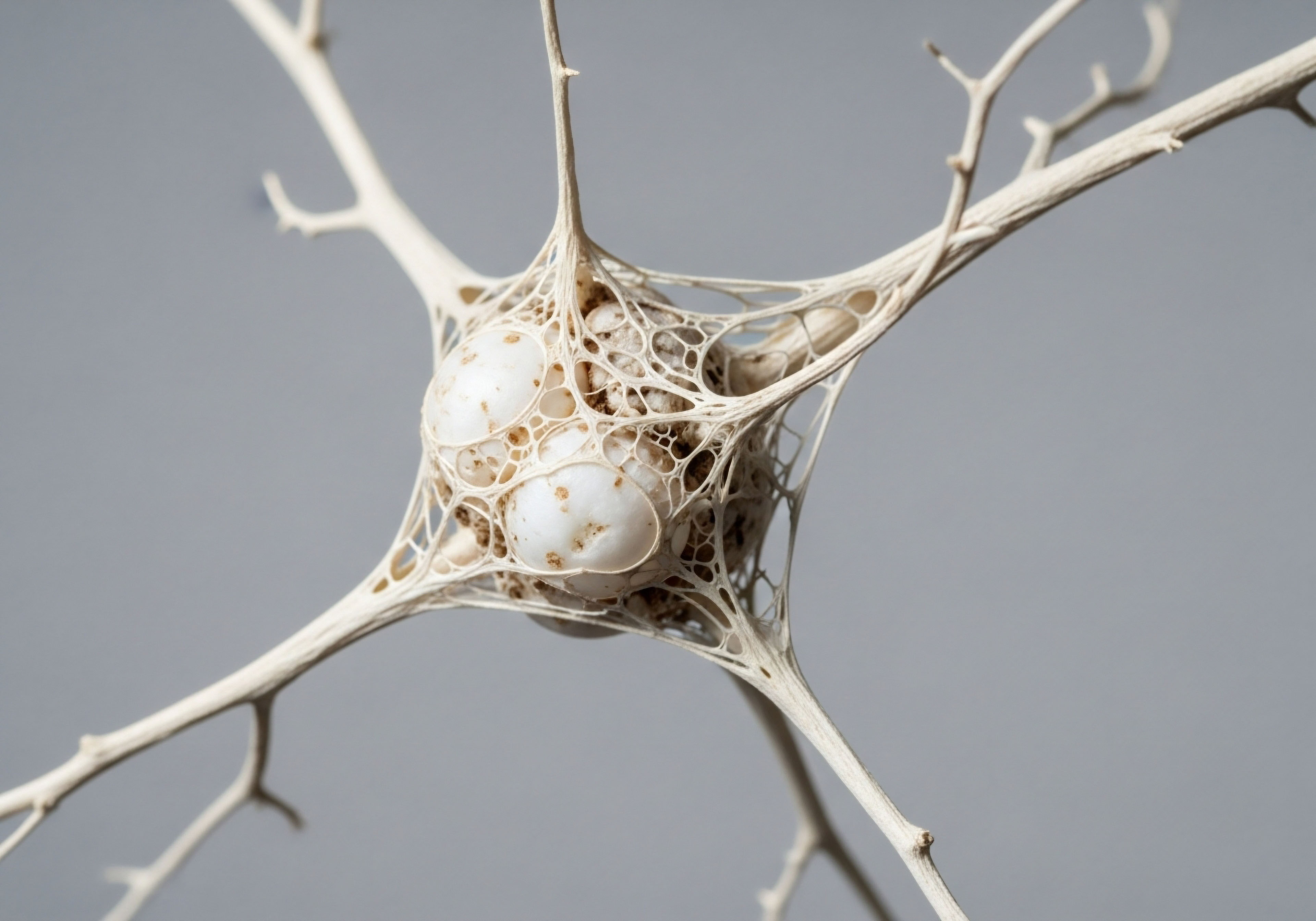

Fundamentals

Your Biological Blueprint in the Digital Age
The decision to explore your genetic landscape originates from a deeply personal place ∞ a desire to understand the intricate workings of your own body and to reclaim a sense of control over your health. When you send a saliva sample to a wellness platform, you are engaging in an act of profound self-discovery.
You are opening a conversation with your own biology, seeking insights that feel uniquely yours. This process provides you with a dataset of immense personal significance, a biological blueprint that outlines predispositions and potentials encoded within your DNA.
This genetic information is unlike any other form of personal data you might share. It possesses three distinct qualities that command careful consideration. First, it is inherently familial; your genome is a tapestry woven from the genetic threads of your ancestors and passed on to your descendants.
An insight into your health is simultaneously a partial insight into the health of your parents, siblings, and children. Second, your genetic code is a stable and permanent identifier, a biological signature that will not change over your lifetime. Third, this information has a predictive dimension. While it does not dictate your destiny, it speaks in the language of probabilities, offering clues about future health trajectories that can be both empowering and unsettling.
Your genetic code offers a stable, lifelong blueprint with predictive insights into your health.

The Journey of Your Data
Once your sample is analyzed, your genetic information begins a journey that extends far beyond the initial report you receive. The platform that provides your health insights also becomes the custodian of your biological blueprint. This digital version of your DNA is stored on servers, where it is subject to the company’s data security measures and privacy policies.
These policies are the contractual agreements that govern how your most personal information can be used, shared, and protected. Understanding the terms of this custodianship is a central component of managing your genetic information responsibly.
The long-term existence of your data in a corporate database creates a permanent record. Even when “de-identified,” meaning stripped of your name and address, the uniqueness of DNA itself presents a complex challenge. Scientific studies have demonstrated that with sufficient computational power and access to other public datasets, re-identifying individuals from anonymized genetic information is a tangible possibility. This reality shapes the long-term implications of creating a digital copy of your biological essence.


Intermediate

Connecting Your Code to Your Endocrine System
Your genetic blueprint contains specific chapters dedicated to the intricate communication network of your body the endocrine system. The science of pharmacogenomics examines how your unique genetic variations influence your response to medications and hormones. This field provides a powerful lens through which to understand why hormonal optimization protocols require such careful, individualized calibration. Wellness platforms may provide reports on certain genetic markers related to hormone metabolism, offering what appears to be a personalized roadmap to hormonal health.
Consider the Cytochrome P450 family of enzymes, which are critical for processing hormones like estrogen. Genetic variations can lead to different rates of enzyme activity, classifying individuals as poor, intermediate, or rapid metabolizers.
This genetic reality directly impacts how your body manages its hormonal environment and how it might respond to therapies like Testosterone Replacement Therapy (TRT), where managing estrogen levels with medications like Anastrozole is a key component of the protocol. A wellness platform might identify your metabolizer status, yet the interpretation of that raw data point requires deep clinical context.
Pharmacogenomics reveals how your genes shape your body’s response to hormonal therapies.

What Are the Practical Applications in Clinical Settings?
In a clinical setting, this genetic information becomes a valuable component of a much larger diagnostic mosaic. It is integrated with comprehensive lab results, your personal and family medical history, and your subjective experience of symptoms. This holistic view allows a physician to tailor a hormonal optimization protocol with precision. For instance, understanding your genetic predispositions in hormone receptor sensitivity can inform dosing strategies for progesterone or testosterone, creating a truly personalized therapeutic approach.
The table below juxtaposes the potential of this information in two different contexts a wellness platform and a clinical environment.
| Genetic Insight | Wellness Platform Interpretation | Clinical Application |
|---|---|---|
| COMT Gene Variant | General report on being a “slow” or “fast” metabolizer of catecholamines, linked to stress. | Informs strategies for managing estrogen metabolites and may influence dosing of hormone therapy due to its role in neurotransmitter and hormone breakdown. |
| CYP19A1 Gene (Aromatase) | Indicates a tendency to convert testosterone to estrogen at a higher or lower rate. | Guides the clinical decision-making process for using an aromatase inhibitor like Anastrozole in a male TRT protocol, tailoring the dose to the patient’s specific metabolic signature. |
| SHBG Gene Variants | Report on genetic likelihood for higher or lower levels of Sex Hormone-Binding Globulin. | Provides context for interpreting total vs. free testosterone levels, refining TRT dosing to achieve optimal levels of bioavailable hormones. |

The Gaps in Current Protections
Legislation such as the Genetic Information Nondiscrimination Act (GINA) in the United States offers important protections. It prevents health insurers and employers from using your genetic information to make coverage or employment decisions. This is a foundational safeguard. GINA’s protections, however, have defined boundaries.
The law does not apply to other forms of insurance, including life insurance, disability insurance, or long-term care insurance. As your genetic data persists over decades, the potential for this information to influence financial or insurance-related decisions in these uncovered domains remains an open question.


Academic

Polygenic Risk Scores and the Future of Predictive Health
The analytical frontier of personal genetics is the domain of the Polygenic Risk Score (PRS). A PRS moves beyond single-gene analysis to provide a comprehensive assessment of risk for a specific condition. It aggregates the small contributions of hundreds, sometimes thousands, of genetic variants across your genome into a single, statistically powerful score.
This score can estimate your likelihood of developing complex conditions such as coronary artery disease, type 2 diabetes, or experiencing earlier-than-average menopause, relative to the general population.
When you share your genetic data with a wellness platform, you are providing the raw material for the creation of these highly predictive scores. The long-term implication is the existence of a detailed, probabilistic dossier on your future health. This dossier, held by a commercial entity, represents a new category of personal information.
Its interpretation requires a sophisticated understanding of statistics and human biology. A PRS is a statement of probability, a risk stratification tool. It is not a diagnosis. The convergence of this predictive power with commercial interests creates a landscape of profound ethical and physiological considerations.
- Statistical Power The aggregation of many small genetic effects gives PRSs a level of predictive accuracy for certain conditions that surpasses single-gene tests.
- Systems-Biology Perspective A PRS inherently reflects a systems-biology viewpoint, acknowledging that complex diseases arise from the interplay of numerous biological pathways, a concept central to understanding endocrine and metabolic health.
- Longitudinal Significance The predictive value of a PRS may increase over time as scientific understanding of gene-environment interactions grows, meaning the data you share today could yield more sensitive insights in the future.

How Might This Data Influence Endocrine Health Management?
The endocrine system is a network of exquisitely balanced feedback loops. A PRS for a metabolic condition like type 2 diabetes provides a window into the potential resilience or vulnerability of your insulin signaling pathways.
For an individual seeking to optimize their metabolic health, perhaps through peptide therapies like CJC-1295/Ipamorelin that can influence insulin sensitivity, this information could be immensely valuable in the hands of a knowledgeable clinician. It could inform the intensity of lifestyle interventions and the selection of therapeutic protocols designed to support metabolic function proactively.
A Polygenic Risk Score aggregates thousands of genetic inputs into a single, powerful metric of future health probability.
The challenge arises when this complex data is held and interpreted by non-clinical platforms. The commercialization of your polygenic risk creates a durable, transferable asset for the company holding your data. The data can be aggregated and sold for research, used to market supplements, or licensed to other entities. This creates a fundamental tension between the potential for clinical good and the risk of commercial exploitation or misinterpretation.
| Domain | Potential Clinical Utility | Long-Term Commercial/Platform Risk |
|---|---|---|
| Metabolic Health (Type 2 Diabetes PRS) | Informs proactive strategies for lifestyle and diet; may guide the use of therapies that improve insulin sensitivity. | Targeted advertising for unproven supplements; data could be used by long-term care insurers to assess risk. |
| Cardiovascular Health (Coronary Artery Disease PRS) | Motivates early and aggressive management of lipids and blood pressure; provides context for hormone therapy decisions in men and women. | Creation of health-related anxiety; potential for data to be sought in underwriting for life or disability insurance. |
| Female Hormonal Health (Age at Menopause PRS) | Allows for proactive planning around fertility and the eventual need for menopausal hormone therapy. | Marketing of products aimed at delaying aging; potential for psychological distress without proper clinical counseling. |

The Concept of the Data Legacy
Sharing your genetic information establishes what can be termed a “data legacy.” This legacy is permanent and has implications not only for you but for your biological relatives. The ethical framework for this new reality is still developing. It requires us to consider the stewardship of our most fundamental biological information with a perspective that spans decades.
The convenience of a wellness report today must be weighed against the creation of a permanent, predictive, and potentially commercializable asset that will exist for the remainder of our lives and beyond.

References
- McGuire, Amy L. et al. “The ethics of genomics.” Nature Reviews Genetics, vol. 9, no. 2, 2008, pp. 153-161.
- Erlich, Yaniv, and Arvind Narayanan. “Routes for breaching and protecting genetic privacy.” Nature Reviews Genetics, vol. 15, no. 6, 2014, pp. 409-421.
- Allyse, Megan A. et al. “Direct-to-consumer genetic testing ∞ a review.” Obstetrics and Gynecology, vol. 131, no. 4, 2018, pp. 675-683.
- Clayton, Ellen Wright, et al. “The law of genetic privacy ∞ applications, implications, and limitations.” Journal of Law and the Biosciences, vol. 6, no. 1, 2019, pp. 1-36.
- Wieser, Simon. “Personalized medicine ∞ the promised land of effectiveness and efficiency? A systematic review and meta-analysis.” Value in Health, vol. 19, no. 5, 2016, pp. 578-586.
- Visscher, Peter M. et al. “10 years of GWAS discovery ∞ biology, function, and translation.” The American Journal of Human Genetics, vol. 101, no. 1, 2017, pp. 5-22.
- Torkamani, Ali, et al. “The personal and clinical utility of polygenic risk scores.” Nature Reviews Genetics, vol. 19, no. 9, 2018, pp. 581-592.
- Shabani, Mahsa, and Pascal Borry. “Rules for processing genetic data for research purposes in view of the new EU General Data Protection Regulation.” European Journal of Human Genetics, vol. 26, no. 2, 2018, pp. 149-156.

Reflection
You began this inquiry seeking to understand your body’s internal language. The knowledge encoded in your genome is a powerful tool for self-awareness, offering a new vocabulary to describe your unique biology. This information, however, is the beginning of a conversation, not the final word.
It is the raw data from which clinical wisdom is carefully extracted. As you move forward, consider the distinction between possessing a map of your biological terrain and having the guidance of an experienced navigator to traverse it. Your health journey is a dynamic process of discovery, and the ultimate power lies in how you translate this profound knowledge into deliberate, informed action under trusted clinical care.



